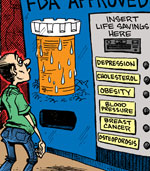Information on Magnesium Supplements
| Share on Facebook | Share on Twitter | Share on Google+ |
Do You Need Magnesium Supplements?

Magnesium is an essential mineral in the human body, and is a necessary component in over 300 of the body's critical metabolic functions.
A magnesium deficiency is quite a common problem, and with all the refined and processed foods we regularly consume, it is no surprise. Not only do these foods deny our bodies the full range of nutrition that we require to function, they contain many additives that are actually harmful to our health.
Moreover, there are many factors in the modern lifestyle that actually speed up the depletion of magnesium from the body, such as stress, caffeine, sugar, alcohol, medications, and even an excessive amount of calcium.
So what can we do to create more balance in our bodies? By adding a variety of healthy foods to our diet, eliminating magnesium-draining factors from our lives, and by complementing our nutrition plan with magnesium supplements, we can promote our general health.
The Benefits of Taking a Magnesium Supplement
- Energy Production - Magnesium is the second most abundant intracellular mineral in the body, and it plays a crucial role in each cell's energy production. The enzymes that trigger energy production are dependent on magnesium, and a deficiency can result in a chronic lack of energy. Many chronic fatigue patients have a low level of magnesium in their red blood cells but the use of magnesium supplements seems to help reduce the chronic tiredness and increase energy levels.
- The Anti-stress Mineral - Multiple studies have established a link between magnesium deficiency and depression. People with anxiety and other nervous disorders, and children with ADD (Attention Deficit Disorder) and ADHD (Attention Deficit Hyperactivity Disorder) show significant magnesium deficiencies. In a recent study, children with ADHD who have used magnesium supplements for 6 months have showed a significant decrease in hyperactivity symptoms. Magnesium also has natural tranquilizing properties, especially when combined with calcium.
- A Healthier Heart - Magnesium improves heart rate, dilates blood vessels, and prevents blood clotting and heart attacks. Magnesium is thus important in maintaining a healthy circulatory system.
- Other Health Benefits - Magnesium is an important element in hundreds of the body's enzyme systems, making it a crucial component in many of the body's essential chemical reactions. Magnesium has also been scientifically proven to bring relief a variety of conditions, including cramps, asthma, kidney stones, diabetes, high blood pressure, migraine and tension headaches, premenstrual tension, and osteoporosis.
Magnesium Rich Foods
It makes sense to consume a healthy diet that includes many magnesium rich foods. These include almonds, nuts, seeds, soybeans, unrefined cereals, wholegrain bread, and dark green vegetables.
Carolyn Dean, M.D., N.D. - Author of The Miracle of Magnesium
How to Choose the Best Magnesium Supplement
Despite its vital role in numerous bodily functions, magnesium is often an overlooked nutrient and many people do not consume the recommended daily intake. Older adults, pregnant women, athletes, alcoholics, and people under stress are at a greater risk of magnesium deficiency and should consider taking supplements to ensure that their magnesium levels are adequate.
Here are some tips to help you find the best magnesium supplement.- Select a Magnesium Dietary Supplement that is Easily Absorbed by the Body
Dietary supplements use many different sources of magnesium, and these differ widely in their ability to be absorbed by the body. Avoid supplements that include magnesium in an inorganic oxide form, which although is inexpensive, is less easily absorbed. Choose instead a supplement with magnesium citrate, which provides far better absorption.
An excessive consumption of calcium can also decrease the rate at which magnesium is absorbed, so if you are taking a calcium supplement, ensure that your magnesium intake is large enough to compensate. Most experts suggest a calcium/magnesium ratio of 2 to 1. - Working with Other Nutrients
The presence of magnesium is essential for the functioning of other substances in the body - it is a necessary ingredient for calcium absorption and works in conjunction with calcium in building bones and teeth. It is also critical for vitamins B1, B2 and B6 as it activates the enzymes that use these vitamins.
Therefore, an effective magnesium supplement should address these synergetic interconnections in order to maximize the benefits to your health. - Know your Manufacturer - In the end, the quality of the product you buy depends on the quality of the manufacturer who produces it. Since poor quality nutritional supplement production is a common problem, choose a producer that follows the pharmaceutical GMP compliance, which will ensure manufacturing and quality control procedures are optimal
-
Skin CareMen Skin Care
-
Free ResourcesFree eBooks
-
To think is to practice brain chemistry.Deepak Chopra
-
Featured Health Supplement
 provides a broad spectrum of around 80 of the nutrients that your body needs…including vitamins,
minerals, trace elements, antioxidants, amino acids, neuronutrients, bioflavonoids, carotenoids, herbal extracts, enzymes and other complementary co-factor ingredients.
provides a broad spectrum of around 80 of the nutrients that your body needs…including vitamins,
minerals, trace elements, antioxidants, amino acids, neuronutrients, bioflavonoids, carotenoids, herbal extracts, enzymes and other complementary co-factor ingredients.
-



















